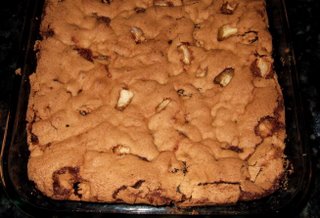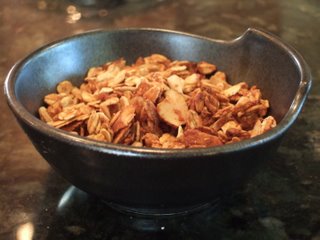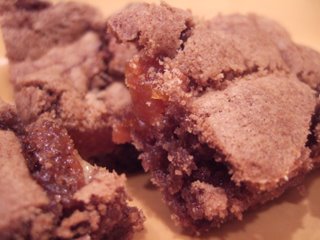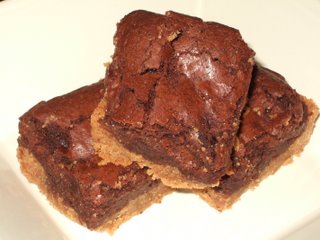
I've got a short list of desserts that can be put together in the time it takes the oven to pre-heat, get no more than a couple of bowls dirty, and are still worth the calories. They're the ones I turn to an hour before we have to leave for our weekly potluck dinner, or when we're having friends over for dinner on a weekday and I haven't set aside extra time for puttering; the ones that I've made often enough that I barely need to read the recipe any more.
Emily Luchetti's cookbook
A Passion for Desserts has a nice sounding simple apple cake, with the apple mixed into the batter, which looked like it could be a new such recipe. I have several of her cookbooks, and trust her desserts to work. My one quibble with this one is that it calls for vegetable oil. I usually skip over oil-based cake recipes; I'd rather get flavor from my fat calories. I've made a few things with browned butter recently, and really like the complex nutty flavor it adds, so I decided to use it instead of the oil. (I probably shouldn't do this without making the cake straight once, but hey, what are friends for if not to experiment on?) She also calls for golden raisins, which I replaced with dried sour cherries, and walnuts, which I left out.
Then I've got my
Penzey's cinnamon. Sure, fresh spices are always better than old ones, and Penzey's generally has good-quality spices, but it's their cinnamon that made a convert of me. You know what cinnamon tastes like, right? It's that sweet spicy brown stuff. Well, supermarket cinnamon is to their China Cassia as "natural lemon flavor" is to real lemon. It's got overtones and afternotes and all sorts of interesting things going on. If you bake at all, try some.
The cake had an unusual texture. The inside was fairly moist and dense, and the top formed an almost crispy crust. I liked it, but it was nothing like the typical more muffin-like cake. I don't know how much that's due to the substitution of butter for oil; I'll probably try it again with oil to compare. It was pretty sweet, which I expected from a recipe that calls for as much sugar as flour; next time, I'll make sure to use tart apples. Emily Luchetti serves it with whipped cream or vanilla ice cream, which would balance the sweetness nicely; this isn't an apple dessert to serve with caramel sauce. The sour cherries worked; dried apricots would as well, and it would probably be great with cranberries. It's definitely worth making again, particularly given how easy it is.
1/2 cup (one stick) butter
3 small apples, peeled and cup into 1/2 inch chunks
2 eggs
2 cups sugar
2 tsp cinnamon
2 cups flour
2 tsp baking soda
1 tsp salt
1 cup dried sour cherries
Preheat over to 350. Line a 9 by 13 inch pan with parchment paper.
Melt the butter in a saucepan over medium heat. Let it continue to cook until the solids start to brown. Set aside to cool
Whisk the eggs with the sugar in a large bowl. Add the cinnamon, apples, and cooled butter. (The original recipe added 1/2 cup walnuts at this point.) Sift the flour, baking soda, and salt together, and then stir in with the rest of the ingredients. Stir in the cherries.
The batter is pretty thick; press it into the pan, spreading it out. Bake for about 45 minutes, until a toothpick comes out clean, or with a few moist crumbs.






